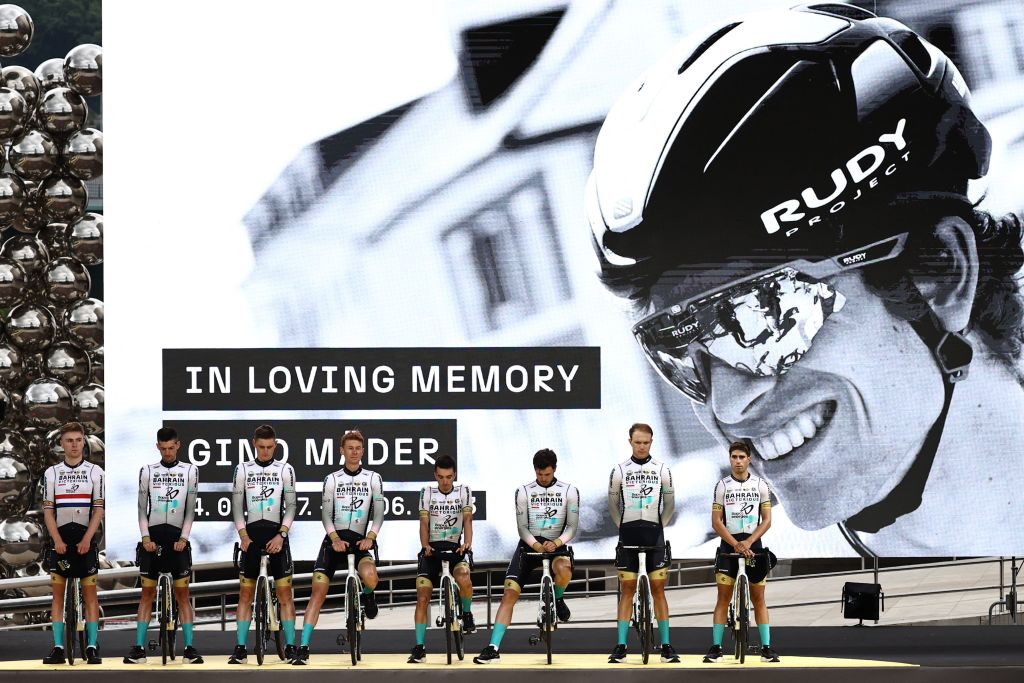Tour de France remove race number 61 in remembrance of Gino Mäder
'We do what we can to mitigate risks but they'll never be gone' says Tom Pidcock

The Tour de France will remember Gino Mäder during this year's race, with organisers opting not to issue race number 61.
Mäder's Bahrain Victorious teammates will wear numbers from 62 to 69 at the race, with the team leader's number not used during the race as a sign of mourning and remembrance.
A minute's silence was held to remember Mäder during the team presentation on Thursday evening when the Bahrain Victorious' riders were on stage, with the Basque fans in attendance showing signs to remember Mäder.
Mäder died following a high-speed crash on the descent of the Albulapass on stage 5 of the Tour de Suisse. He was airlifted to hospital immediately afterwards and doctors fought to save his life but passed away a few hours later.
His death sparked an outpouring of affection and reflection, with the peloton riding in memory of Mäder in the final kilometres of stage 6 and world champion Remco Evenepoel paying tribute as he won solo on stage 7. Other riders dedicated victories to Mäder in other races.
Riders are still saddened by the tragic death of the Swiss rider, with rider safety now a far bigger concern in the peloton.
The UCI and other major stakeholders in the sport are due to announce significant new safety measures on Friday afternoon, while new CPA riders' association president Adam Hansen is working hard to push for improvements in rider safety.
Get The Leadout Newsletter
The latest race content, interviews, features, reviews and expert buying guides, direct to your inbox!
Hansen has revealed he recently had a long call about safety at the Tour de France with the UCI, the AIGCP teams association and race organiser ASO after riders' concerns about the long Alpine descents to the finish on stages 14 and 17.
The Australian revealed on Twitter that ASO have confirmed the descents will have new asphalt and will also feature audio warning signs before corners and padding on barriers around dangerous corners. He'll also ride the descents before the stages, videoing them so riders can see them, as well as provide further feedback and safety requests.
Riders seem aware that they also need to respect each other more and limit the risk they take in races.
There have been calls for high-speed descents to be removed from finishes in the final kilometres of races to avoid the risks of crashes. EF Education-EasyPost team manager Jonathan Vaughters and Matteo Trentin of UAE Team Emirates have suggested nets on key points of descent could help reduce serious injury if crashes occur.
Tom Pidcock and most riders accept there will always be risks in professional racing and that it is up to the rider to ride safely. Pidcock is known for his descending and bike skills and said he avoids taking uncalculated risks.
"Obviously it was a very emotional day for everyone in cycling, especially those who were in the Tour de Suisse, and his teammates and his family," Pidcock said ahead of the Tour de France.
"I didn't see a single rider take any risks after the incident in the final two stages of the race. Personally, I think one of the things that hit me was it happened descending, which is something that I love. That showed me what the consequences can be when it goes wrong.
"I never take uncalculated risks when I'm descending. But things can happen. We're riding down mountains at 100kph. We're not surrounded and protected by foam. I guess we do what we can to mitigate risks but they'll never be gone."

Stephen is one of the most experienced member of the Cyclingnews team, having reported on professional cycling since 1994. He has been Head of News at Cyclingnews since 2022, before which he held the position of European editor since 2012 and previously worked for Reuters, Shift Active Media, and CyclingWeekly, among other publications.